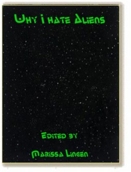Here’s Marissa Lingen with one of those ideas that ought to be obvious, and yet is so very much not-obvious in practice that I’m very glad she wrote about it.
When her critiquers suggested that her books needed more setting, she made a plan for including more setting:
Very, very early on in the writing process I started thinking about setting and the specific locations that each scene would take place in. Then I sat down and wrote settingy stuff for those scenes first. Sometimes it was just a few lines, sometimes a paragraph or more, but, for example, when the protag was going to join her crazy mad scientist magician genius little sister in said sister’s room for some crazy mad science magic, I did not let myself run along with what they were doing until after I had put down some thoughts about what a crazy mad scientist magician genius little sister’s room would look like.
A great idea for adding description, but also a great idea for adding anything that you tend to under-write—because it is so much harder to add this sort of thing in later, when you’ve already got carefully crafted paragraphs, each one leading to the next, beginning with a great opening image and ending with a nice little cliffhanger.
And however great this idea is, much greater is her insight that people who are naturally good at something usually have no idea how someone who is not naturally good at it can get better.
I learned that fairly early, with my difficulties learning how to spell. Teachers tried putting me next to people who were good at spelling, in the hopes that their spelling skills would somehow rub off on me. This did not work at all, because people who are naturally good at spelling have no idea how to get better at spelling. (People who are naturally good at spelling tend to be people who see words in their head and then can just read off the letters and write them down. Since I can’t do that, I had to come up with a completely different way to get (barely adequately) good at spelling.)
I’m always on the lookout for people who do well things they aren’t naturally good at. They’re often hard to spot. (Spend thousands of hours honing your craft, and you too can look like someone who’s naturally good at something.) But there are clues—such as earlier works where the author or artist wasn’t as good, and works where some aspects are crafted like a masterpiece, while other aspects show merely a journeyman’s skill. Those are the people who might have some insight into how they got better.
With this sort of thing, it’s always useful to put it in terms of KA Ericsson’s model for the acquisition of expert performance. Just practice isn’t enough to get better at something—you also need to monitor your performance and evaluate your success—with help, such as a critique group, when possible. Then you need to figure out how to do it better—which Marissa’s post is a perfect worked example of.


 “Anger Management” in the anthology Why I Hate Aliens, edited by Marissa Lingen. Published by
“Anger Management” in the anthology Why I Hate Aliens, edited by Marissa Lingen. Published by